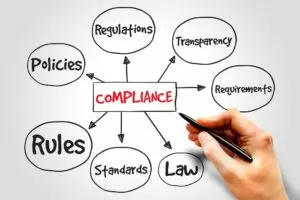
A Regulatory Compliance Manager ensures organizations adhere to environmental regulations and legislation. According to May 2024 BLS data, employment for Environmental Scientists and Specialists-including Regulatory Compliance Managers-is projected to grow 6% from 2022 to 2032. These professionals earn a median annual salary of $80,060, with most positions requiring a bachelor's degree in environmental science, law, or a related field.
Regulatory Compliance Managers ensure organizations meet environmental regulations in an ever-evolving legislative landscape. These professionals bridge the gap between environmental science, policy, and practical business operations-monitoring compliance with federal, state, and local environmental standards while adapting to new regulations as they emerge. What's legal today may require revision tomorrow, which is why organizations across industries rely on these specialists to navigate complex regulatory environments and protect them from costly violations.
What Does a Regulatory Compliance Manager Do?
As organizations operate in the environmental compliance sector, they must continuously adapt to changing legislation. Regulatory Compliance Managers serve as the organization's regulatory compass, interpreting new requirements and implementing systems to ensure ongoing adherence. In the environmental sector, this means overseeing materials processing, waste management procedures, and environmental health and safety compliance. They also monitor internal regulations-industry agreements that aren't legally binding but represent professional standards and best practices.
These professionals compile detailed reports for senior managers and decision-makers, translating complex regulatory requirements into actionable business strategies. They conduct routine premises inspections at factories, offices, shopping centers, and other facilities to verify compliance with current standards. Regulatory Compliance Managers work independently or as part of teams, frequently consulting with environmental law professionals within their organization or industry to develop proposals and implementation plans.
Where Does a Regulatory Compliance Manager Work?
BLS statistics estimate approximately 85,000 individuals work as Environmental Scientists and Specialists (including compliance managers) across the United States. The federal government employs the largest share-around 21% of professionals-working in public buildings and on public lands to ensure government bodies, employees, and civil service operations comply with federal and international regulations. These professionals divide their time between office work and field inspections, typically working for independent oversight bodies or government agencies.
State governments employ approximately 14% of compliance professionals, while local governments account for another 10%. Private enterprises employ around 15,000 individuals (approximately 6% of the field). These companies must comply with legislation at local, state, national, and sometimes international levels, depending on their size and scope. Maintaining regulatory compliance helps them avoid sanctions, fines, and legal complications that could damage their operations and reputation.
The insurance industry employs roughly 8,000 professionals (approximately 3-4% of the field), where they assess compliance for claims evaluation, underwriting, and insurance premium calculations. These specialists serve as vital links between insurers and policyholders, often establishing requirements that become part of insurance policy terms and conditions.
Work environments vary considerably. Compliance managers typically spend part of their time in offices analyzing regulations, preparing reports, and coordinating with legal teams. They also conduct on-site facility inspections, which may involve visiting manufacturing plants, construction sites, waste management facilities, or other regulated locations. Travel requirements depend on the position-some roles focus on a single facility, while others oversee multiple sites across regions.
Regulatory Compliance Manager Salary
Regulatory Compliance Managers fall under the broader Bureau of Labor Statistics category "Environmental Scientists and Specialists, Including Health" (SOC 19-2041), which encompasses a variety of compliance-focused roles. According to May 2024 data, these professionals earn competitive salaries reflecting their specialized expertise and the critical nature of their work.
National Salary Data (May 2024)
These figures reflect BLS data for Environmental Scientists and Specialists, including Health (SOC 19-2041), which encompasses many Regulatory Compliance Managers.
| Percentile | Annual Salary | Hourly Wage |
|---|---|---|
| 10th Percentile | $50,130 | $24.10 |
| 25th Percentile | $62,090 | $29.85 |
| Median (50th) | $80,060 | $38.49 |
| Mean (Average) | $88,640 | $42.62 |
| 75th Percentile | $103,730 | $49.87 |
| 90th Percentile | $134,830 | $64.82 |
Salaries vary based on experience level, education, industry sector, and geographic location. Federal government positions often offer competitive salaries along with comprehensive benefits packages. Senior-level compliance managers with extensive experience and advanced degrees typically earn salaries in the upper percentiles, particularly in industries with complex regulatory requirements like nuclear energy, pharmaceuticals, or chemical manufacturing.
Qualifications and Skills
Regulatory Compliance Managers need a balanced combination of technical knowledge, analytical abilities, and communication skills. Entry-level positions typically require a bachelor's degree in environmental science, environmental policy, law, or a related field-though several years of relevant industry experience may substitute for formal education in some cases.
These professionals must navigate complex regulatory frameworks while communicating requirements clearly to diverse stakeholders. Essential competencies include strong written and verbal communication skills for preparing compliance reports and advising management on regulatory matters. Critical thinking and analytical abilities help them assess compliance issues, identify potential violations before they occur, and develop practical solutions that align with both regulatory requirements and business operations.
Successful compliance managers demonstrate exceptional organizational skills, managing multiple compliance initiatives simultaneously while maintaining meticulous documentation. They need attention to detail when reviewing policies, conducting inspections, and documenting findings-small oversights can lead to significant compliance failures. The ability to work both independently and collaboratively is essential, as they often conduct solo inspections but must coordinate with legal teams, management, and regulatory agencies.
Position requirements vary by industry. Healthcare compliance focuses on HIPAA regulations and patient safety standards, while environmental compliance emphasizes EPA requirements and state environmental quality acts. Manufacturing compliance managers address OSHA safety requirements alongside environmental regulations. Food industry compliance centers on FDA standards and food safety protocols. This diversity means professionals can transfer their core regulatory skills across sectors while developing specialized industry knowledge.
Senior-Level Requirements
Senior positions and area manager roles require superior knowledge and extensive management experience. Beyond entry-level competencies, senior compliance managers need strong project management skills to oversee compliance across single or multiple company operations. They direct or facilitate training programs to create an organizational compliance culture, actively communicate policy changes to employees, and administer research initiatives that inform management-level recommendations. Senior professionals must identify systemic compliance issues and present strategic solutions that balance regulatory requirements with operational efficiency.
How to Become a Regulatory Compliance Manager
A bachelor's degree is essential for entering this field. High school students interested in environmental compliance should focus on mathematics and English language arts. Mathematics helps with statistical analyses and calculations that appear in compliance reports and risk assessments. Strong English skills are critical-compliance managers communicate constantly with stakeholders, prepare detailed written reports, and must convey complex regulatory requirements clearly to non-technical audiences.
Your degree choice depends on your target industry. For environmental compliance careers, related environmental policy or environmental law degrees provide excellent foundations. Ideally, consider a law degree supplemented with minors and electives in environmental science and policy. This combination gives you regulatory interpretation skills alongside technical environmental knowledge. Finance-focused degrees suit financial compliance roles, healthcare administration degrees prepare you for healthcare compliance, and so on.
Master's degrees are increasingly advantageous in a competitive job market. While not required for entry-level positions, graduate education provides deeper expertise, enhanced project experience, and competitive advantages for advancement. Regulatory complexity continues to increase across sectors, making advanced training valuable for career progression and access to senior management positions.
Check your industry's certification and licensing requirements carefully. Some sectors and states require specific licenses or professional certifications to practice in compliance roles. Environmental compliance positions may require certifications like Certified Hazardous Materials Manager (CHMM) or environmental auditor credentials. Healthcare compliance often requires Certified in Healthcare Compliance (CHC) credentials. Research requirements for your target industry and location early in your educational planning.
Building Practical Experience
Internships with regulatory agencies, environmental consulting firms, or corporate compliance departments provide invaluable experience. Many students gain entry through environmental health and safety roles, junior compliance analyst positions, or regulatory affairs assistant positions. Federal agencies like the Environmental Protection Agency offer student internship programs. State environmental agencies and local government environmental departments also provide practical training opportunities. This hands-on experience helps you understand how regulations translate into daily operations and builds the professional network that often leads to full-time positions.
Regulatory Compliance - Related Degrees
Career Advancement Opportunities
Regulatory compliance offers clear advancement pathways. Entry-level compliance analysts or specialists typically focus on monitoring specific regulations within defined areas. As you gain experience, you advance to compliance manager roles with broader oversight responsibilities, supervising teams of analysts and managing comprehensive compliance programs across multiple regulatory domains.
Senior compliance managers and directors shape organizational compliance strategy, working directly with C-suite executives on regulatory risk management and policy development. Some professionals specialize deeply in particular regulatory areas-air quality compliance, water resource regulations, hazardous waste management, or specific industry regulations. This specialized expertise can command premium compensation and consulting opportunities.
Alternative career paths leverage compliance expertise. Many compliance managers transition into environmental consulting, advising multiple organizations rather than working for a single employer. Others move into regulatory affairs, working with industry associations to influence policy development and regulatory interpretation. Some pursue roles in regulatory agencies themselves, shifting from ensuring compliance to developing and enforcing regulations. Teaching and academic positions attract experienced professionals who want to train the next generation of compliance experts.
Job Outlook for Regulatory Compliance Managers
Employment of environmental scientists and specialists, including regulatory compliance managers, is projected to grow 6% from 2022 to 2032, roughly as fast as the average for all occupations. This growth translates to approximately 4,800 new positions over the decade, with about 6,900 job openings annually when accounting for workers transitioning out of the occupation through retirement or career changes.
Several factors drive this steady demand. Environmental regulations continue increasing in complexity at the federal, state, and international levels, requiring specialized expertise to interpret and implement. Expanded environmental programs addressing climate change, sustainability, and renewable energy create new compliance requirements across industries. Growing public and governmental concern about environmental protection pressures organizations to maintain rigorous compliance programs. Corporate focus on environmental, social, and governance (ESG) compliance has elevated regulatory adherence from a legal requirement to a business priority affecting investor relations and public reputation.
The approaching retirement of experienced compliance professionals creates replacement opportunities, particularly in government positions where long-tenured experts will need succession. The largest growth is expected in private sector consulting firms as businesses increasingly seek external expertise to navigate regulatory requirements rather than maintaining large internal compliance departments. Government positions will remain relatively stable, with opportunities arising primarily through replacement rather than expansion.
Geographic variation in demand reflects regional regulatory priorities and industry concentrations. States with active environmental programs and large manufacturing sectors-California, Texas, Pennsylvania, and Illinois-typically show stronger demand. Coastal regions with marine and coastal zone regulations, states with significant energy production (both fossil fuel and renewable), and areas with major federal installations provide consistent opportunities.
Professional Organizations for Regulatory Compliance Managers
Most professional bodies focus on specific industries due to the specialized nature of regulatory frameworks. These organizations provide continuing education, certification programs, networking opportunities, and regulatory updates critical for staying current in this rapidly evolving field.
- International Network for Environmental Compliance and Enforcement: Most environmental legislation now operates at international levels, requiring global cooperation. This network brings together compliance professionals worldwide, facilitating knowledge exchange on regulatory approaches, enforcement strategies, and emerging environmental challenges across borders.
- Environmental Assessment Association: While not exclusively for compliance officers, this association connects compliance professionals with site assessors and sampling technicians. Members share data on environmental monitoring, assessment methodologies, and compliance verification approaches.
Frequently Asked Questions
What degree do I need to become a Regulatory Compliance Manager?
Most entry-level positions require a bachelor's degree in environmental science, environmental policy, environmental law, or a related field. Master's degrees are increasingly valuable for career advancement and senior-level roles, particularly as competition increases and regulatory frameworks grow more complex.
Do I need a license to work as a Regulatory Compliance Manager?
Licensing requirements vary by industry and state. Some specialized sectors require specific certifications or professional licenses. Environmental compliance may require certifications like Certified Hazardous Materials Manager (CHMM), while healthcare compliance often requires Certified in Healthcare Compliance (CHC) credentials. Check your target industry's requirements and state regulations to determine if additional credentials are necessary.
Where do most Regulatory Compliance Managers work?
The largest employers are federal government agencies (21%), state governments (14%), local governments (10%), private enterprises (6%), and insurance companies (approximately 3-4%). These professionals work in offices preparing reports and conducting analysis, while also performing on-site inspections at facilities. Work environments vary from government buildings to manufacturing plants, construction sites, and waste management facilities.
How does environmental compliance differ from other compliance roles?
Environmental compliance focuses specifically on adherence to environmental legislation regarding materials processing, waste management, air quality, water resources, and environmental health and safety. This differs from financial compliance (banking regulations, securities law), healthcare compliance (HIPAA, patient safety), or data privacy compliance (GDPR, CCPA), though the core principles of regulatory interpretation, risk assessment, and compliance verification remain similar across domains.
What is the job outlook for Regulatory Compliance Managers?
Employment is projected to grow 6% from 2022 to 2032, with approximately 4,800 new positions created and about 6,900 annual job openings. Growth is driven by increasingly complex environmental regulations, expanded climate change and sustainability programs, corporate ESG initiatives, and the retirement of experienced professionals. Private sector consulting shows the strongest growth, while government positions remain stable with opportunities primarily through replacement needs.
Key Takeaways
- Strong Earning Potential: Environmental compliance managers earn a median salary of $80,060 annually (May 2024 BLS data), with mean salaries of $88,640, and experienced professionals in senior positions earn $100,000+.
- Steady Job Growth: The field is projected to grow 6% from 2022 to 2032, creating approximately 4,800 new positions and generating 6,900 annual job openings across all experience levels, including replacement needs.
- Diverse Employment Sectors: Opportunities exist in federal government (21% of roles), state and local government (24% combined), private enterprises (6%), insurance industries (approximately 3-4%), and growing consulting sectors.
- Educational Foundation: A bachelor's degree in environmental science, policy, or law is required for entry-level positions, with master's degrees increasingly important for advancement in a competitive job market with evolving regulatory complexity.
- Cross-Industry Demand: Core compliance skills transfer across healthcare, manufacturing, environmental, finance, and food industries, providing career flexibility and diverse opportunities while building specialized industry expertise.
Ready to pursue a career in environmental compliance? Explore degree programs in environmental science, environmental law, and policy that can prepare you for this rewarding field.
2024 US Bureau of Labor Statistics salary and job growth figures for Environmental Scientists and Specialists reflect state and national data, not school-specific information. Conditions in your area may vary. Data accessed January 2026.






